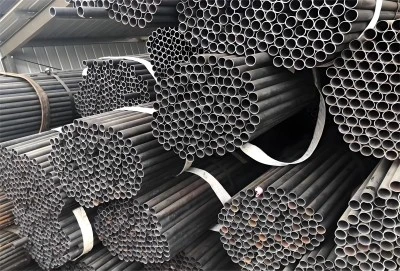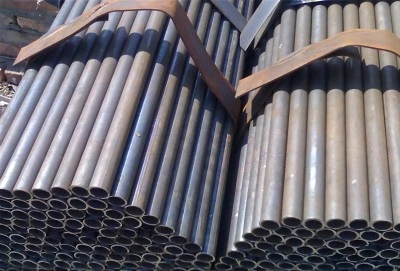In the world of steel piping, two manufacturing processes stand out: Electric Resistance Welding (ERW) and seamless pipe production. While both methods have their merits, ERW pipes have gained significant popularity in recent years due to their unique advantages. This article will explore the primary benefits of ERW pipes over their seamless counterparts, focusing on three key areas: greater availability and scalability, uniform wall thickness, and ease of customization.
Electric resistance welded pipes are manufactured by rolling flat steel strips into a cylindrical shape and welding the seam using electrical resistance. This process results in a high-quality, cost-effective pipe that's suitable for various applications across industries. Let's delve into the specific advantages that make ERW pipes a preferred choice for many projects.
|
|
|
Greater Availability and Scalability
One of the most significant advantages of electric resistance welded pipes over seamless pipes is their greater availability and scalability. The manufacturing process for ERW pipes is more efficient and allows for higher production rates, making these pipes more readily available in the market.
ERW pipe production begins with steel coils, which are easily sourced and stored. The manufacturing process is continuous, allowing for large-scale production with minimal interruptions. This efficiency translates to shorter lead times and better inventory management for suppliers and end-users alike.
In contrast, seamless pipe production is a more complex and time-consuming process. It involves creating a hollow cylinder from a solid steel billet, which is then stretched and shaped to the desired dimensions. This method limits production capacity and often results in longer lead times.
The scalability of ERW pipe production also means that manufacturers can quickly adjust to market demands. They can easily modify production parameters to create pipes of various sizes and specifications without significant retooling or downtime. This flexibility is particularly beneficial in industries where project requirements can change rapidly, such as oil and gas or construction.
Moreover, the greater availability of ERW pipes often leads to more competitive pricing. The efficiency of production and lower manufacturing costs allow suppliers to offer these pipes at more attractive price points compared to seamless pipes, making them an economical choice for many applications.
Uniform Wall Thickness
Another primary advantage of electric resistance welded pipes is their consistent and uniform wall thickness. The ERW manufacturing process allows for precise control over the pipe's dimensions, resulting in a product with excellent uniformity throughout its length.
During production, the steel strip is carefully rolled to the desired thickness before being formed into a pipe. The welding process then joins the edges without adding extra material, maintaining the original thickness of the steel. Advanced quality control measures, including ultrasonic testing and eddy current inspection, ensure that the weld seam is as strong as the base metal and that the wall thickness remains consistent.
This uniformity offers several benefits:
- Improved flow characteristics: The consistent internal diameter allows for smooth and predictable fluid flow, which is crucial in applications such as oil and gas transportation.
- Better pressure resistance: Uniform wall thickness ensures that the pipe can withstand pressure evenly along its entire length, reducing the risk of weak points.
- Enhanced corrosion resistance: A consistent wall thickness helps maintain the pipe's integrity over time, even in corrosive environments.
- Ease of installation: Uniform pipes are easier to join and align, simplifying installation processes and reducing labor costs.
In comparison, seamless pipes may exhibit slight variations in wall thickness due to the nature of their production process. While these variations are usually within acceptable tolerances, they can sometimes lead to inconsistencies in performance, especially in high-pressure or critical applications.
Ease of Customization
The third major advantage of electric resistance welded pipe is their ease of customization. The ERW manufacturing process lends itself well to producing pipes with specific characteristics tailored to various applications and industry requirements.
Customization options for ERW pipes include:
- Size range: ERW pipes can be produced in a wide range of diameters and wall thicknesses, accommodating diverse project needs.
- Material selection: Manufacturers can use different grades of steel or even other metals to create ERW pipes with specific properties, such as increased strength or corrosion resistance.
- Surface finish: The surface of ERW pipes can be customized through various treatments, including galvanization, painting, or coating, to enhance their performance in specific environments.
- End finishing: ERW pipes can be easily modified with different end treatments, such as threading, beveling, or flanging, to suit various connection requirements.
- Heat treatment: Post-weld heat treatment can be applied to ERW pipes to alter their mechanical properties, improving strength or stress relief.
This flexibility in customization allows ERW pipes to meet the exacting standards of various industries, including oil and gas, construction, automotive, and more. For instance, in the energy sector, ERW pipes can be customized to withstand high pressures and corrosive environments, while in construction, they can be tailored for specific load-bearing capacities.
Seamless pipes, while also customizable to some extent, often require more complex and costly processes to achieve the same level of specialization. The inherent nature of seamless pipe production limits certain customization options, particularly in terms of size range and material selection.
Longma Group
Electric resistance welded pipes offer significant advantages over seamless pipes in terms of availability, scalability, uniform wall thickness, and ease of customization. These benefits make ERW pipes an excellent choice for a wide range of applications across various industries. As technology continues to advance, we can expect further improvements in ERW pipe manufacturing, potentially widening the gap between ERW and seamless pipes in terms of performance and cost-effectiveness.
Longma Group Electric Resistance Welded Steel Pipe is manufactured to meet a range of industry standards, ensuring quality and reliability. Adhering to specifications from API 5L, ASTM A53, ASTM A500, ASTM A252, and ASTM A795, these pipes are designed for various applications in the oil, gas, and construction industries, providing a robust solution for both structural and pressure piping needs. If you are choosing your electric resistance welded pipe manufacturers, welcome to contact LONGMA GROUP at info@longma-group.com.














